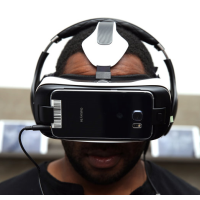Breaking News! …is Coming Soon in Virtual Reality
 (photo: Neilson Barnard, Getty Images for Samsung)
(photo: Neilson Barnard, Getty Images for Samsung)
By Omar L. Gallaga, New York Times
AUSTIN, Texas -- Chipmaker AMD is entering a partnership with the Associated Press to push virtual-reality technology the news organization can use for its reports.
AMD will provide high-end computer hardware and its suite of virtual-reality software tools, dubbed "LiquidVR," to help AP create more 360-degree video and virtual-reality reporting.
Virtual-reality headsets that have been promised for years are finally starting to hit the market this year, including Facebook-owned Oculus Rift and the HTC Vive, both high-end VR headsets that require tethering to a high-end gaming PC. Other headsets are expected from Sony alongside virtual-reality gear that only requires a smartphone to operate, such as Google's Cardboard headsets and the Samsung Gear VR.
The content that AP is creating using AMD's tools would, at least for the time being, scale to high-end VR headsets as well as cheaper phone-powered ones and even non-VR Web browsers. AP has already been producing that kind of content, including a warehouse tour called "Rush Delivery" and a 360-degree news report from a migrant camp in Calais, France.
AMD's formal headquarters are in Sunnyvale, California, but Austin is where most of its senior executives live and much of its engineering is done. The company, one of the world's largest chipmakers, has about 1,600 employees in Central Texas.
Sasa Marinkovic, AMD's global head of VR marketing, said the company is focused on making its tools interactive for viewers and providing the highest image quality possible.
"This is what excited us at AMD, to bring this new medium to all these different areas where VR is going to be radically changing the experience of the content," Marinkovic said.
The kinds of top-of-the-line VR experiences that headsets such as the Oculus Rift will provide require lots of computing and graphical horsepower. When Oculus Rift went on pre-sale in early January, it warned buyers that the headset would require a very powerful gaming PC to operate using either graphics hardware from AMD or one of its competitors, Nvidia.
PC manufacturers including Dell Inc., its gaming line Alienware and Asus have responded by introducing PCs specifically geared to Oculus. Hardware that can handle VR can make the experience smoother and less prone to making people motion-sick, Marinkovic said.
Paul Cheung, director of interactive and digital news production at the Associated Press, said VR is the latest in AP's continuing adoption of new technologies, dating back to the wireless telegraph and radio.
"VR promises to be the next revolution," Cheung said. "It can get the user deep inside the story. For a lot of experiences we're going to create, we really think about how the user interacts with the content with and without the headset."
Though AP's digital team utilizing VR is small, Cheung said, it will leverage its vast network of reporters to determine stories that could benefit from the technology. They'll use a range of VR cameras as well as creating original computer-generated environments, he said.
The future of VR could also involve standalone headsets that don't require a tether to a PC. According to reports, Google is working on a headset that wouldn't require a phone or computer to power it.
Marikovic declined to say whether AMD is working on hardware to power such devices, but said AMD is always "Looking at the industry and exploring."
- Top Stories
- Unusual News
- Where is the Money Going?
- Controversies
- U.S. and the World
- Appointments and Resignations
- Latest News
- Musk and Trump Fire Members of Congress
- Trump Calls for Violent Street Demonstrations Against Himself
- Trump Changes Name of Republican Party
- The 2024 Election By the Numbers
- Bashar al-Assad—The Fall of a Rabid AntiSemite






Comments